时态:一般现在时和一般将来时
英语时态8种基本时态讲解.ppt课件

8.过去完成时 表示动作发生在过去某一时间之前已经完成的动作或状态, 强调“过去的过去”, 常与 by the time, by the end of…,before , by 等引导时间的状语连用。
基本结构 主语+ had + 动词过去分词 + 其他成分 When I got to the cinema yesterday the film had begun already. He had learned English before he came here.
现在完成时与一般过去时的区别: 1)现在完成时侧重于对现在的影响;而一般过去时侧重于某一动作发生在过去某个时间或某段时间。即现在完成时侧重于现在的结果,而一般过去时侧重于动作发生的时间。例如:
I have seen the film. 我看过这部电影。(现在我仍记得电影的内容) I saw the film three days ago. 三天前我看了这部电影。(强调是三天前,而不是别的什么时候看的电影)
be going to含有“打算,准备”的意思,而will则没有这个意思, She is going to lend us her book. He will be here in half an hour.
be about to+V.原形(意为马上做某事,在时间上指最近的将来) I am about to leave school. 不能与表示时间的副词连用。 They are about to set out.(√) They are about to set,变y为i加-ed. study----studied carry----carried cry----cried try----tried d)以元音字母+y结尾的单词直接加-ed. play----played stay----stayed
一般现在时态和一般将来时态
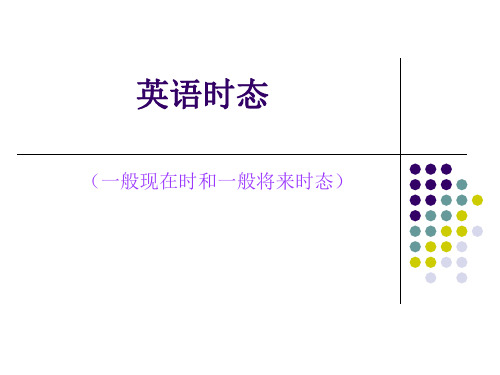
1. Her father is a pilot. 2. My sister can sing songs very well. 3. We are going to go to Shanghai tomorrow. 4. Mr. Li went to the cinema yesterday. 5. Miss Yu teaches us math. 6. I often go to school by train. 7. Max will be the best in our class. 8. They fly kites in spring every year.
英语时态
(一般现在时和一般将来时态)
一般现在时态和一般将来时态的对比 一般现在时态和一般将来时态的对比
一般将来时态: 一般现在时态: 表示将要、打算做某事; 表示经常、反复发生的 动作或者存在的状态; 时间标志: 时间标志: tomorrow(明天), everyday每天 next week(下周), often经常 always总是 in the future(将来 ); usually通常 sometimes有时 动词形式: 动词形式: 1. will +动词原形 1. 动词原形 2. be going to +动词原形 2. 动词第三人称单数
will water is going to water ______________
把下面的句子变成否定句: 把下面的句子变成否定句:
先找be 和can(will) 直接变;没有 先找 ( ) 直接变 没有do, does, did 来帮忙 没有 请来do, does, did 来帮忙;自己别忘回原样! 请来 来帮忙;自己别忘回原样!
Exercises: :
英语六级翻译时态与语态考点整理

英语六级翻译时态与语态考点整理时态和语态是英语翻译中的两个重要考点。
正确掌握时态和语态的变化规则对于提高翻译水平至关重要。
本文将整理英语六级翻译中的常见时态和语态考点,以便帮助读者更好地应对六级翻译考试。
1. 时态考点时态在英语中用来表示动作发生的时间。
常见的时态包括一般现在时、一般过去时、一般将来时、现在进行时、过去进行时、过去将来时等。
以下是各个时态的用法和常见翻译问题:1.1 一般现在时一般现在时表示经常性的、普遍性的或固定的动作或状态。
常常使用时间状语词,如always, usually, often, sometimes等。
常见问题有:- 原句:He goes to school by bus.译文:他乘公交车上学。
- 原句:She likes reading books.译文:她喜欢读书。
1.2 一般过去时一般过去时表示过去某个具体时间内发生的动作或状态。
常见问题有:- 原句:They visited the Great Wall last week.译文:他们上周参观了长城。
- 原句:She lived in Beijing for five years.译文:她在北京生活了五年。
1.3 一般将来时一般将来时表示将来某个时间发生的动作或状态。
常见问题有:- 原句:I will call you tomorrow.译文:我明天会给你打电话。
- 原句:He is going to travel around the world next year.译文:明年他将会周游世界。
1.4 现在进行时现在进行时表示现在正在进行的动作。
常见问题有:- 原句:She is watching TV at the moment.译文:她此刻正在看电视。
- 原句:They are studying English in the library.译文:他们正在图书馆学习英语。
1.5 过去进行时过去进行时表示过去某个时间正在进行的动作。
(完整版)一般现在时、现在进行时、一般将来时、一般过去时四大时态讲解表格对比总结
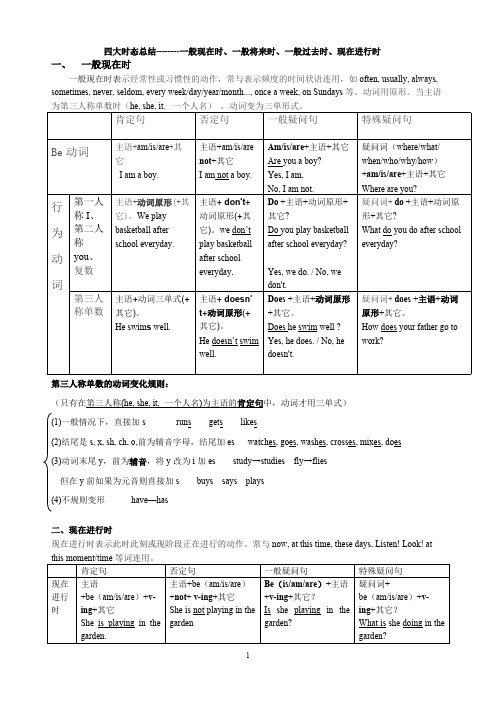
四大时态总结--------一般现在时、一般将来时、一般过去时、现在进行时一、一般现在时一般现在时表示经常性或习惯性的动作,常与表示频度的时间状语连用,如often, usually, always, sometimes, never, seldom, every week/day/year/month..., once a week, on Sundays等。
动词用原形。
当主语为第三人称单数时(he, she, it, 一个人名),动词变为三单形式。
肯定句否定句一般疑问句特殊疑问句Be动词主语+am/is/are+其它I am a boy.主语+am/is/arenot+其它I am not a boy.Am/is/are+主语+其它Are you a boy?Yes, I am.No, I am not.疑问词(where/what/when/who/why/how)+am/is/are+主语+其它Where are you?第一人称I、第二人称you、复数主语+动词原形(+其它)。
We playbasketball afterschool everyday.主语+ don't+动词原形(+其它)。
we don’tplay basketballafter schooleveryday.Do +主语+动词原形+其它?Do you play basketballafter school everyday?Yes, we do. / No, wedon't.疑问词+do +主语+动词原形+其它?What do you do after schooleveryday?行为动词第三人称单数主语+动词三单式(+其它)。
He swim s well.主语+ doesn’t+动词原形(+其它)。
He doesn’t swimwell.Does +主语+动词原形+其它。
Does he swim well ?Yes, he does. / No, hedoesn't.疑问词+ does +主语+动词原形+其它。
一般现在时与一般将来时的区别
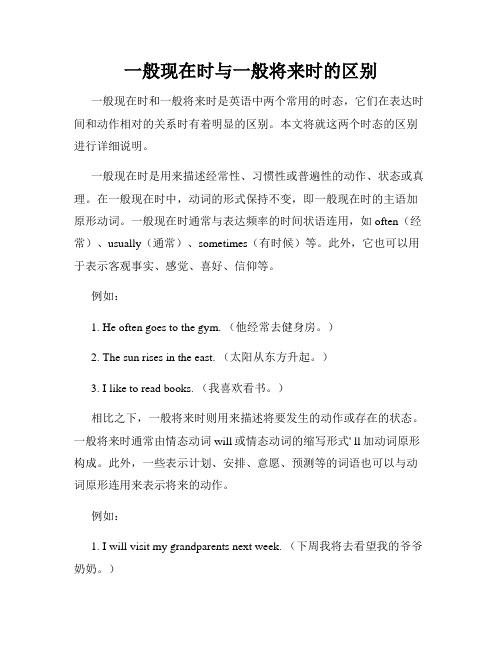
一般现在时与一般将来时的区别一般现在时和一般将来时是英语中两个常用的时态,它们在表达时间和动作相对的关系时有着明显的区别。
本文将就这两个时态的区别进行详细说明。
一般现在时是用来描述经常性、习惯性或普遍性的动作、状态或真理。
在一般现在时中,动词的形式保持不变,即一般现在时的主语加原形动词。
一般现在时通常与表达频率的时间状语连用,如often(经常)、usually(通常)、sometimes(有时候)等。
此外,它也可以用于表示客观事实、感觉、喜好、信仰等。
例如:1. He often goes to the gym. (他经常去健身房。
)2. The sun rises in the east. (太阳从东方升起。
)3. I like to read books. (我喜欢看书。
)相比之下,一般将来时则用来描述将要发生的动作或存在的状态。
一般将来时通常由情态动词will或情态动词的缩写形式' ll加动词原形构成。
此外,一些表示计划、安排、意愿、预测等的词语也可以与动词原形连用来表示将来的动作。
例如:1. I will visit my grandparents next week. (下周我将去看望我的爷爷奶奶。
)2. She is studying hard because she'll have an important exam tomorrow. (她正在努力学习,因为明天她将有一场重要的考试。
)3. Tomorrow, we are going to have a picnic in the park. (明天,我们计划去公园野餐。
)在一般现在时和一般将来时中,动词的形式是不同的,且它们分别在时间和动作的表达上有着不同的目的和功能。
一般现在时强调现在的行为、状态或普遍性的事实,而一般将来时则表示将来的动作或存在的状态。
总结起来,一般现在时和一般将来时的区别主要体现在以下几个方面:动词形式不同,时间概念不同,以及表达的目的和功能不同。
一般现在时,一般过去时,一般将来时及现在进行时
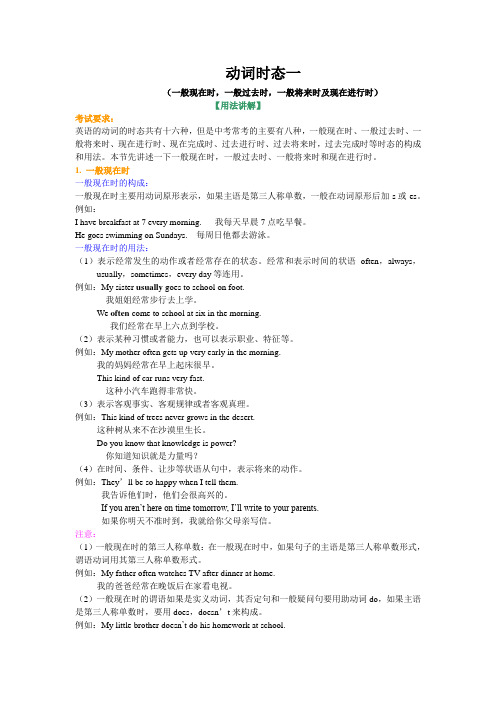
动词时态一(一般现在时,一般过去时,一般将来时及现在进行时)【用法讲解】考试要求:英语的动词的时态共有十六种,但是中考常考的主要有八种,一般现在时、一般过去时、一般将来时、现在进行时、现在完成时、过去进行时、过去将来时,过去完成时等时态的构成和用法。
本节先讲述一下一般现在时,一般过去时、一般将来时和现在进行时。
1. 一般现在时一般现在时的构成:一般现在时主要用动词原形表示,如果主语是第三人称单数,一般在动词原形后加-s或-es。
例如:I have breakfast at 7 every morning. 我每天早晨7点吃早餐。
He goes swimming on Sundays. 每周日他都去游泳。
一般现在时的用法:(1)表示经常发生的动作或者经常存在的状态。
经常和表示时间的状语often,always,usually,sometimes,every day等连用。
例如:My sister usually goes to school on foot.我姐姐经常步行去上学。
We often come to school at six in the morning.我们经常在早上六点到学校。
(2)表示某种习惯或者能力,也可以表示职业、特征等。
例如:My mother often gets up very early in the morning.我的妈妈经常在早上起床很早。
This kind of car runs very fast.这种小汽车跑得非常快。
(3)表示客观事实、客观规律或者客观真理。
例如:This kind of trees never grows in the desert.这种树从来不在沙漠里生长。
Do you know that knowledge is power?你知道知识就是力量吗?(4)在时间、条件、让步等状语从句中,表示将来的动作。
例如:They’ll be so happy when I tell them.我告诉他们时,他们会很高兴的。
英语七年级下册人教版一般将来时和一般现在时两种时态笔记概念构成动词形式

英语七年级下册人教版一般将来时和一般现在时两种时态笔记概念构成动词形式1.一般现在时(1)结构:当主语是第三人称单数时,谓语动词用第三人称单数形式。
(2)动词的第三人称单数形式变化规则如下:①直接加s。
如:work-works。
②以“辅音字母+y”结尾的词,先变y为i,再加es。
如:carry-carries;cry-cries;try-tries;study一studies。
③以s,x,o,ch,sh结尾的词加es。
如:wash-washes;teach-teaches;go-goes;pass一passes;fix-fixes。
④特殊:have has;am/are is(3)用法:①表示习惯性的动作。
常与seldom,often,usually,always,sometimes,today,every day,once a week,every five minutes,on Sundays等时间状语连用。
如:I go to school at seven every day.我每天七点去上学。
②表示普遍真理和客观事实。
如:The earth goes around the sun.地球绕着太阳转。
③表示在现里所发生的一个动作。
如:Here comes the bus.公共汽车来了。
④在时间和条件状语从句中代替一般将来时。
如:I'll go shopping with my mother if sheis free tomorrow.如果明天我妈妈有空,我将和她去购物。
3.一般将来时(1)结构:助动词shall/will+动词原形;be going to+动词原形(2)用法:①表示将要发生的动作或状态,常用的时间状语有later(on),soon,in a month(in+时间段),next time,from now on,tomorrow等。
如:I shall be eighteen years old next year.明年我就18岁了。
七个时态:一般现在时、现在进行时、将来时:begoingto(=will)、一般过去时、过去进行时、过去完成时、现在

主要要一下七个时态:一般现在时、现在进行时、将来时:be goingto(= will )、一般过去时、过去进行时、过去完成时、现在完成进行时。
(1)一般现在时1.一般现在时表示经常或习惯性的动作,也可表示现在的状态或主语具备的性格和能力。
2.一般现在时中,没有be动词和情态动词,主语为第三人称单数的肯定句,动词要按规则加上s,主语是非第三人称单数的肯定句,动词用原形。
3.在一般现在时中,句中有be动词或情态动词时,否定句在be 动词和情态动词后加not,一般疑问句将be动词或情态动词放在句4.在一般现在时中,句中没有be动词或情态动词时,主语为第三人称单数的否定句在动词前加does+not (doesn’t),一般疑问句在句首加does,句子中原有动词用原形;主语为非第三人称单数,否定句用do+not (don’t),一般疑问句在句首加do,句子中动词用原形。
5.动词+s的变化规则1)一般情况下,直接加-s,如:cook-cooks, milk-milks2)以s. x. sh. ch. o结尾,加-es,如:guess-guesses,wash-washes,watch-watches, go-goes3)以“辅音字母+y”结尾,变y为i, 再加-es,如:study-studies6. 句中be动词和动词一般情况下只能有一种而且也必须有一种。
如:The childrenare very happy on Christmas Day .7.一般现在时中的be动词:一般用原形:am is aream用于第一人称单数(I);is用于第三人称单数(he she it和其他人名或称谓,如:Ben his sister等);are用于第二人称单数(you)和所有复数(包括第一人称复数we、第二人称复数you;第三人称复数they和其他复数,如his parents等)。
8.一般过去时中的动词:有两种情况:第一种情况:主语是第三人称单数(he she it 和其他,如Helen 、her cousin 等),动词后一般加s或es。
一般现在时-现在进行时-一般将来时

1一般现在时( Present Simple)2。
现在进行时(Present Continuous)3. 将来的安排和打算( Future Arrangements and Intentions)一、一般现在时、现在进行时(一)、辨”个性”一般现在时表示经常性或习惯性的动作,以及主语的特征或状态。
1。
表示主语现在的状态或特征。
例如:I am a teacher.We have a very good relationship with our parents.2。
表示经常性或习惯性动作。
例如:My father goes to work by bike every day。
I always leave home for school at 6:303 。
表示自然现象,普遍真理,客观存在或科学事实。
例如:Shanghai lies in the east of China.The earth moves around the sun.现在进行时表示现在或现阶段正在进行的动作。
例如:1。
表示现在(指说话人说话时)正在发生的事情We are waiting for you at the moment。
2. 表示现阶段正在进行或发生的动作President Xi is visiting in the USA these days。
(二)、辨结构一般现在时的结构是:主 + 动词原形或动词的第三人称单数形式 +...。
.。
现在进行时的结构是: 主 + be(are/ is/am),动词的—ing形式+.。
...。
(三)、辨”信息词"一般现在时常和以下这些时间状语连用:always, often, usually=normally, sometimes=at times, regularly, seldom, never, hardly ever, from time to time, once a month, every day, on Sundays。
一般过去时_一般现在时_一般将来时

3. They likes like playing games.
4. Daming watches watchs TV in the evening.
5. Does he usually have has a party?
6. What do they on doSunday? on Sunday
What do the elephants like eating?
4. He sends two emails every week.
How many emails does he send every week?
How often does he send two emails?
5.He has lunch at school.
句型转换:
1 Mr Li invited her to the party.(改为一般疑问句) Did Mr Li invite her to the party?
2 They asked the teacher a question.(改为否定句) They didn’t ask the teacher a question.
4、There was some orange in the cup.(变一般疑问句)
_____ Was there _____ any orange in the cup?
The Simple Future Tense
一般将来时
一般将来时主要表示: ①将要发生的动作; ②将要存在的状态; ③计划、打算做某事; 1.will/shall+动词原形 shall 只用于第一人称(I/we),常被will 所代替;will 在陈述句中用于各人称, 在征求意见时常用于第二人称。 2.be going to +动词原形 1)主语的意图,即:将做某事。例: 2)计划,安排要发生的事。例: 3)有迹象要发生的事(天气)。例: 3.有些词用“现在进行时”表示按计划即将发生的动作,如: 【go, come, start, move, sail, leave, arrive, stay】等。
英文最基本的五个时态
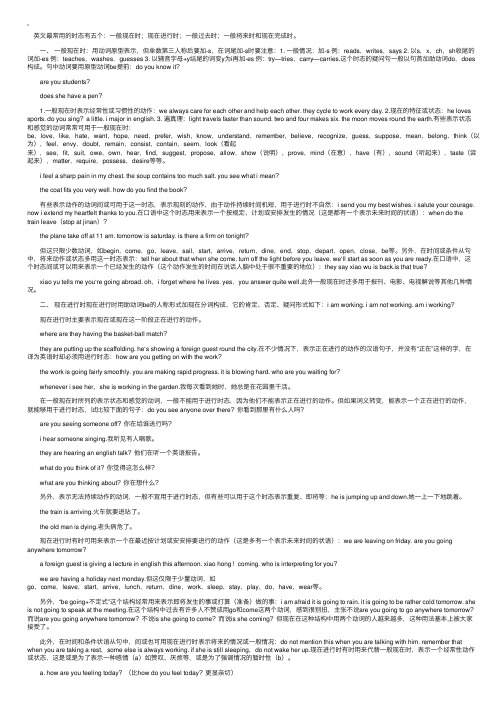
英⽂最常⽤的时态有五个:⼀般现在时;现在进⾏时;⼀般过去时;⼀般将来时和现在完成时。
⼀、⼀般现在时:⽤动词原型表⽰,但单数第三⼈称后要加-s,在词尾加-s时要注意:1. ⼀般情况:加-s 例:reads,writes,says 2. 以s,x,ch,sh收尾的词加-es 例:teaches,washes,guesses 3. 以辅⾳字母+y结尾的词变y为i再加-es 例:try—tries,carry—carries.这个时态的疑问句⼀般以句⾸加助动词do,does 构成。
句中动词要⽤原型动词be提前:do you know it? are you students? does she have a pen?1.⼀般现在时表⽰经常性或习惯性的动作:we always care for each other and help each other. they cycle to work every day.2.现在的特征或状态:he loves sports. do you sing?a little. i major in english.3. 遍真理:light travels faster than sound. two and four makes six. the moon moves round the earth.有些表⽰状态和感觉的动词常常可⽤于⼀般现在时:be,love,like,hate,want,hope,need,prefer,wish,know,understand,remember,believe,recognize,guess,suppose,mean,belong,think(以为),feel,envy,doubt,remain,consist,contain,seem,look(看起来),see,fit,suit,owe,own,hear,find,suggest,propose,allow,show(说明),prove,mind(在意),have(有),sound(听起来),taste(尝起来),matter,require,possess,desire等等。
英语四种时态总结
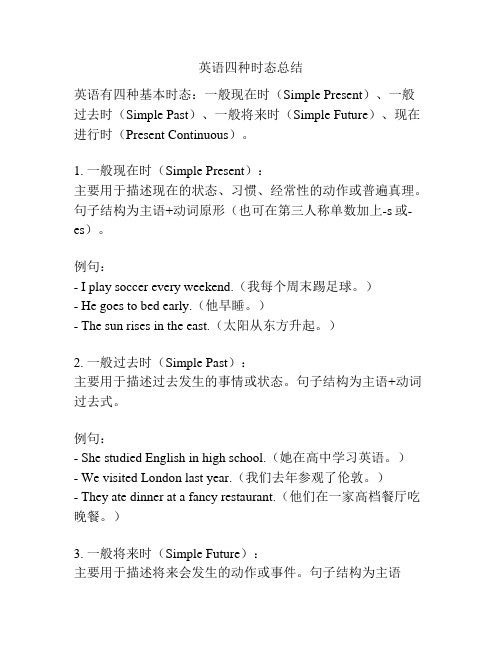
英语四种时态总结英语有四种基本时态:一般现在时(Simple Present)、一般过去时(Simple Past)、一般将来时(Simple Future)、现在进行时(Present Continuous)。
1. 一般现在时(Simple Present):主要用于描述现在的状态、习惯、经常性的动作或普遍真理。
句子结构为主语+动词原形(也可在第三人称单数加上-s或-es)。
例句:- I play soccer every weekend.(我每个周末踢足球。
)- He goes to bed early.(他早睡。
)- The sun rises in the east.(太阳从东方升起。
)2. 一般过去时(Simple Past):主要用于描述过去发生的事情或状态。
句子结构为主语+动词过去式。
例句:- She studied English in high school.(她在高中学习英语。
)- We visited London last year.(我们去年参观了伦敦。
)- They ate dinner at a fancy restaurant.(他们在一家高档餐厅吃晚餐。
)3. 一般将来时(Simple Future):主要用于描述将来会发生的动作或事件。
句子结构为主语+will+动词原形。
例句:- I will go to the gym tomorrow.(我明天会去健身房。
)- She will take the exam next week.(她下周会参加考试。
)- We will have a party on Friday.(我们星期五会举办一场派对。
)4. 现在进行时(Present Continuous):主要用于描述当前正在进行的动作。
句子结构为主语+be动词(am/is/are)+动词的ing形式。
例句:- They are watching a movie now.(他们正在看电影。
英语八大时态总结表

英语八大时态总结表英语语态有八种:一般现在时、一般过去时、一般将来时、现在进行时、过去进行时、将来进行时、现在完成时和过去完成时。
一般现在时:表示经常、习惯性的动作或状态,或通常情况。
例句:I usually wake up at 6 o'clock in the morning.(我通常在早上6点醒来。
)一般过去时:表示过去某个时候发生的动作或状态。
例句:Yesterday, I went to the park with my friends.(昨天,我和我的朋友一起去了公园。
)一般将来时:表示将要发生的动作或状态。
例句:I will go to the concert tomorrow night.(我明晚将去听音乐会。
)现在进行时:表示正在进行的动作或状态。
例句:I am watching TV.(我正在看电视。
)过去进行时:表示在过去某个时间点正在进行的动作。
例句:At 8 o'clock last night, I was watching TV.(昨晚8点,我正在看电视。
)将来进行时:表示在将来某个时间点正在进行的动作。
例句:Tomorrow at 8 o'clock in the evening, Iwill be watching TV.(明天晚上8点,我将会正在看电视。
)现在完成时:表示过去某个时间点开始一直持续到现在的动作或状态。
例句:I have lived in this city for 5 years.(我已经在这个城市住了5年了。
)过去完成时:表示过去某个时间点之前已经完成的动作或状态。
例句:By the time I arrived, they had already left.(我到达的时候,他们已经离开了。
)以上八种语态使用灵活,掌握好各个语态的用法,能够更好地表达自己的意思。
一般现在时和一般将来时

一般现在时:
一般现在时(Simple present)。
表示通常性、规律性、习惯性的状态或者动作有时间规律发生的事件的一种时间状态。
经常性:“经常发生的动作”,比如每天起床、吃饭、上学,一个星期去几次超市或新华书店等。
规律性:在生活中,有的事情是有规律的,有的是偶尔做几次。
这些都算经常发生的事件。
习惯性:这个动作经常发生,是一般的情况而不是具体的某一次。
结构
一般将来时:
一般将来时表示将来某一时刻的动作或状态,或将来某一段时间内经常的动作或状态。
常常和表示将来的时间状语连用。
如:tomorrow(明天),next week(下周);in the future(将来)等。
句型:
①肯定句:主语+ be going to do /主语+will+ 动词原形
②否定句:主语+ be not going to do /主语+ will not+ 动词原形
③疑问句:Be动词+主语+ going to do /Will+主语+ 动词原形
例句:
We are going to go on an outing this weekend.
变为一般疑问句:
Are you going to go on an outing this weekend?
wiil的例句:
He will get married. 他就快结婚了。
动词的四种时态

动词的四种时态动词的四种时态 时态是⼀种动词形式,不同的时态⽤以表⽰不同的时间与⽅式。
它是表⽰⾏为、动作、状态在各种时间条件下的动词形式,在英语中有16种时态。
以下是⼩编为⼤家整理的动词的四种时态相关内容,仅供参考,希望能够帮助⼤家。
动词的四种时态1 (1)⼀般现在时: ⼀般现在时的构成 1. be动词:主语+be(am, is, are)+其它。
如: I am a boy. 我是⼀个男孩。
2. ⾏为动词:主语+⾏为动词(+其它)。
如: We study English. 我们学习英语。
当主语为第三⼈称单数(he, she, it)时,要在动词后加"-s"或"-es"。
如:Mary likes Chinese.玛丽喜欢汉语。
动词+s的变化规则 1.⼀般情况下,直接加-s,如:cook-cooks, milk-milks 2.以s. x. sh. ch. o结尾,加-es,如:guess-guesses, wash-washes, watch-watches, go-goes 3.以“辅⾳字母+y”结尾,变y为i, 再加-es,如:study-studies (2)⼀般过去时: 动词过去式详解动词的过去式的构成规则有: A、规则动词 ①⼀般直接在动词的后⾯加ed:如 worked , learned , cleaned , visited ②以e结尾的动词直接加d:如 lived , danced , used ③以辅⾳字母加y结尾的动词要改y为i再加ed(此类动词较少)如 study – studied carry – carried worry – worried (注意play、stay不是辅⾳字母加y,所以不属于此类) ④双写最后⼀个字母(此类动词较少)如 stopped B、不规则动词(此类词并⽆规则,须熟记)⼩学阶段要记住以下动词的原形和过去式:sing – sang , eat – ate , see – saw , have – had , do – did , go – went , take – took , buy – bought , get – got , read – read ,fly – flew , am/is – was , are – were , say – said , leave – left , swim – swam , tell – told , draw – drew , come – came , lose – lost , find – found , drink – drank , hurt – hurt , feel – felt (3)⼀般将来时: 基本结构: ①be going to + do; ②will+ do. be going to = will I am going to go swimming tomorrow(明天). = I will go swimming tomorrow. (4)现在进⾏时: am,is,are+动词现在分词 动词现在分词详解动词的ing形式的构成规则: ①⼀般的直接在后⾯加上ing , 如doing , going , working , singing , eating ②以e 结尾的动词,要先去e再加ing ,如having , writing ③双写最后⼀个字母的(此类动词极少)有:running , swimming , sitting , getting 动词的四种时态2 ⼀般现在时 主要⽤来表⽰⼈、事物的现在状况和特点;表⽰经常或习惯性的动作,句⼦中常有often, always, from time to time 等时间状语;表⽰客观规律和永恒真理等。
英语语法一般现在时和一般将来时

1.一般现在时的用法1)经常性或习惯性的动作,常与表示频腮度的时间状语连用。
时间状语:every…, sometimes, at…, on Sunday。
例如:I leave home for school at 7 every morning. 每天早上我七点离开家。
2)客观真理,客观存在,科学事实。
例如:The earth moves around the sun. 地球绕太阳转动。
Shanghai lies in the east of China. 上海位于中国东部。
3)表示格言或警句。
例如:Pride goes before a fall. 骄者必败。
注意:此用法如果出现在宾语从句中,即使主句是过去时,从句谓语也要用一般现在时。
例:Columbus proved that the earth is round. 哥伦布证实了地球是圆的。
4)现在时刻的状态、能力、性格、个性。
例如:I don't want so much. 我不要那么多。
Ann writes good English but does not speak well. 安英语写得不错,讲的可不行。
比较:Now I put the sugar in the cup. 把糖放入杯子。
I am doing my homework now. 我正在做功课。
第一句用一般现在时,用于操作演示或指导说明的示范性动作,表示言行的瞬间动作。
第二句中的now是进行时的标志,表示正在进行的动作的客观状况,所以后句用一般现在时。
2. 一般过去时的用法1)在确定的过去时间里所发生的动作或存在的状态。
例如:时间状语有:yesterday, last week, an hour ago, the other day, in 1982等。
例如:Where did you go just now? 刚才你上哪儿去了?2)表示在过去一段时间内,经常性或习惯性的动作。
英语八大时态例句及解析
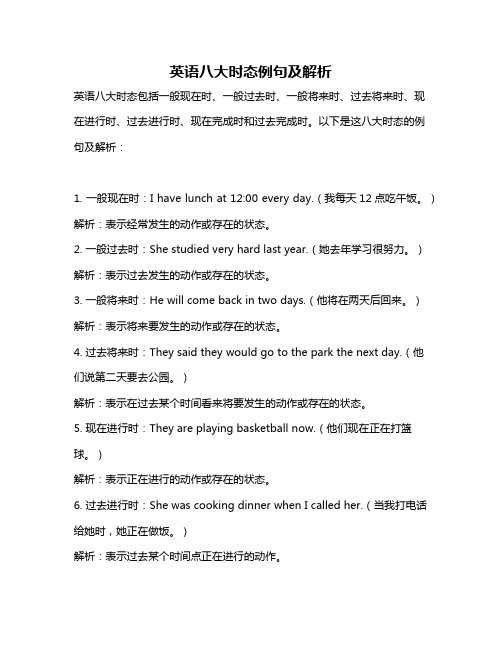
英语八大时态例句及解析英语八大时态包括一般现在时、一般过去时、一般将来时、过去将来时、现在进行时、过去进行时、现在完成时和过去完成时。
以下是这八大时态的例句及解析:1. 一般现在时:I have lunch at 12:00 every day.(我每天12点吃午饭。
)解析:表示经常发生的动作或存在的状态。
2. 一般过去时:She studied very hard last year.(她去年学习很努力。
)解析:表示过去发生的动作或存在的状态。
3. 一般将来时:He will come back in two days.(他将在两天后回来。
)解析:表示将来要发生的动作或存在的状态。
4. 过去将来时:They said they would go to the park the next day.(他们说第二天要去公园。
)解析:表示在过去某个时间看来将要发生的动作或存在的状态。
5. 现在进行时:They are playing basketball now.(他们现在正在打篮球。
)解析:表示正在进行的动作或存在的状态。
6. 过去进行时:She was cooking dinner when I called her.(当我打电话给她时,她正在做饭。
)解析:表示过去某个时间点正在进行的动作。
7. 现在完成时:I have finished my homework.(我已经完成了作业。
)解析:表示已经完成的动作或存在的状态,强调对现在的影响。
8. 过去完成时:They had left before we arrived.(在我们到达之前,他们已经离开了。
)解析:表示在过去的某个时间之前已经完成的动作。
希望能够帮助到您。
如需更多详细信息,建议查阅英语语法书籍或咨询英语教师。
初中英语语法:一般现在时、一般过去时和一般将来时
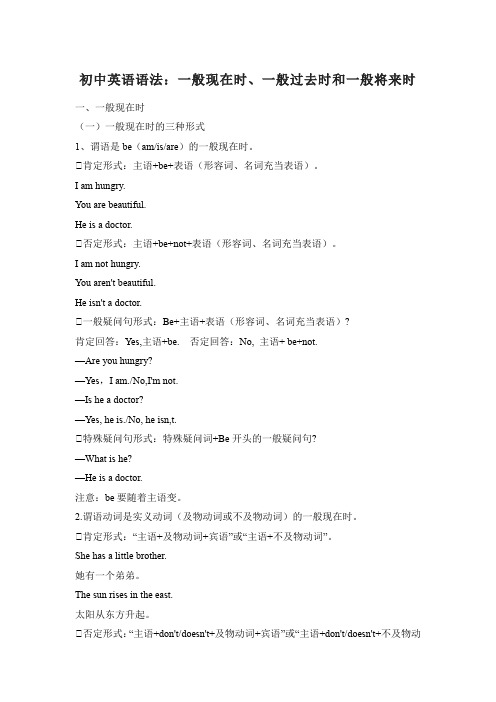
初中英语语法:一般现在时、一般过去时和一般将来时一、一般现在时(一)一般现在时的三种形式1、谓语是be(am/is/are)的一般现在时。
①肯定形式:主语+be+表语(形容词、名词充当表语)。
I am hungry.You are beautiful.He is a doctor.①否定形式:主语+be+not+表语(形容词、名词充当表语)。
I am not hungry.You aren't beautiful.He isn't a doctor.①一般疑问句形式:Be+主语+表语(形容词、名词充当表语)?肯定回答:Yes,主语+be. 否定回答:No, 主语+ be+not.—Are you hungry?—Yes,I am./No,I'm not.—Is he a doctor?—Yes, he is./No, he isn,t.①特殊疑问句形式:特殊疑问词+Be开头的一般疑问句?—What is he?—He is a doctor.注意:be要随着主语变。
2.谓语动词是实义动词(及物动词或不及物动词)的一般现在时。
①肯定形式:“主语+及物动词+宾语”或“主语+不及物动词”。
She has a little brother.她有一个弟弟。
The sun rises in the east.太阳从东方升起。
①否定形式:“主语+don't/doesn't+及物动词+宾语”或“主语+don't/doesn't+不及物动词”。
She doesn't have a little brother.她没有弟弟。
I don't eat every morning.我每天早晨都不吃饭。
①一般疑问句形式:“Do/Does+主语+及物动词原形+宾语”或“Do/Does+主语+不及物动词原形”。
肯定回答:Yes,主语+do/does. 否定回答是:No, 主语+ don't/doesn't.—Do you eat every morning?—Yes, I do./No, I don't.—Does she have a little brother?—Yes, she does./No, she doesn't.①特殊疑问句:特殊疑问词+do/does开头的一般疑问句?What do you like?When do you go to school?注意:根据主语确定用do还是does。
一般现在时、一般过去时、一般将来时、现在进行时
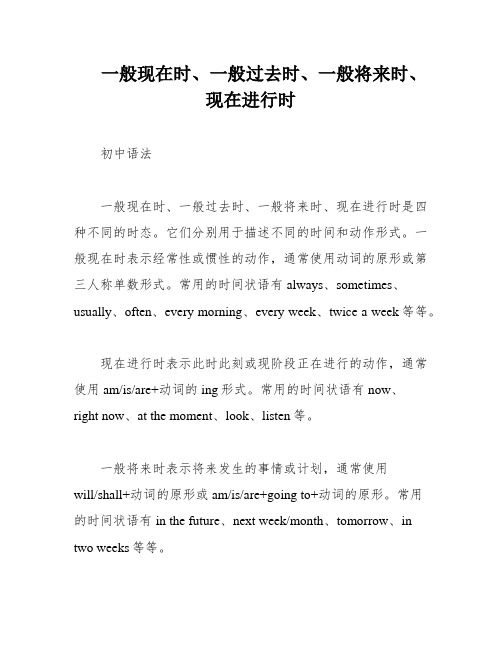
一般现在时、一般过去时、一般将来时、现在进行时初中语法一般现在时、一般过去时、一般将来时、现在进行时是四种不同的时态。
它们分别用于描述不同的时间和动作形式。
一般现在时表示经常性或惯性的动作,通常使用动词的原形或第三人称单数形式。
常用的时间状语有always、sometimes、usually、often、every morning、every week、twice a week等等。
现在进行时表示此时此刻或现阶段正在进行的动作,通常使用am/is/are+动词的ing形式。
常用的时间状语有now、right now、at the moment、look、listen等。
一般将来时表示将来发生的事情或计划,通常使用will/shall+动词的原形或am/is/are+going to+动词的原形。
常用的时间状语有in the future、next week/month、tomorrow、in two weeks等等。
一般过去时表示过去某一时刻或过去某一段时间所发生的动作,与现在无关。
动词的变化规则有以下几种:1)大多数动词在词尾加“S”;2)以辅音字母加“y”结尾的,要先将“y”变为“i”,然后在加“es”;3)以“s。
x。
ch。
sh”结尾的,在词尾加“es”;4)以“o”结尾的动词,加“es”。
现在进行时使用动词的ing形式,变化规则有以下几种:1)一般动词直接在词尾+ing;2)以不发音e结尾的动词,先去e再加ing;3)以重读闭音节结尾且末尾只有一个辅音字母的动词,双写末尾字母,再加ing。
3、一般过去时——动词的变化规则一般过去时是描述过去发生的事情,动词的变化规则如下:1)一般在动词后加-ed。
如:play-played。
offer-offered。
weigh-weighed。
destroy-destroyed。
sign-signed2)在以字母e结尾的动词后,只加-d。
如:like-liked。
- 1、下载文档前请自行甄别文档内容的完整性,平台不提供额外的编辑、内容补充、找答案等附加服务。
- 2、"仅部分预览"的文档,不可在线预览部分如存在完整性等问题,可反馈申请退款(可完整预览的文档不适用该条件!)。
- 3、如文档侵犯您的权益,请联系客服反馈,我们会尽快为您处理(人工客服工作时间:9:00-18:30)。
I.Simple present tense 一般现在时(7A)
a)Simple present tense of the verb to be
We use the simple present tense to talk
about facts and states.
e.g. I am a student.
Amy is my classmate.
We are in Class 1.
否定句
b)Simple present tense of the verb to do
We use the simple present tense when we
talk about:
1.Things that we often do
经常或反复发生的事情/行为
这种用法常与often, usually, always,
sometimes, every day, every morning
等时间状语连用
e.g. Mike gets up at 6:30 every morning.
I often go to school on foot.
I play basketball after school every
Friday.
2.Things that are always true
普遍真理、客观存在、科学事实及格
言、警句
e.g. Cats eats fish.
The sun rises in the east
and sets in
the west.
3.Things that are true now
现在的情况或状态
e.g. I enjoy reading.
Simon likes playing football.
She speaks Spanish.
第三人称he, she, it,动词要用单数,通常在动词
II.Simple future tense一般将来时(7B)
a)Simple future tense with will and shall
We use will or shall when we talk about:
1.things that are sure to happen in the
future
e.g. It will rain this afternoon.
2.plans that we are making now
Note:
will, shall 加原形,表示将来要发生
Be going to加原形,打算、计划要进行
助动词提前表疑问,后跟not是否定
各种人称will 均可用,shall只用第一人称
b)Simple future tense with be going to
We use be going to when we talk about
1.Something we decide to do”
e.g. I am going to visit our new
neighbours.
She is going to watch the film next
Friday.
2.Things that will probably happen:
e.g. It is nine o’clock. We are going to
be late.
It is so cloudy. I think it is going to rain.
Note:
1.Be going to指计划过或思考过的意图或打算,
will do表示未事先思考或未计划而临时做出的决定
e.g. I’m going to see him tomorrow.
我打算明天去看他。
(事先经过思考)
I’ll answer the door.
我去开门。
(未经过事先考虑)
2.Be going to 可表示客观迹象表明马上要发生
的事,而will do则表明说话者的主观意识。
e.g. Look at the clouds. There is going to be a
storm.
看看这些云,暴风雨要来了。
(客观迹象表明要发生)
I hope it will be warm tomorrow.
我希望明天会暖和起来。
(主观意愿)。
